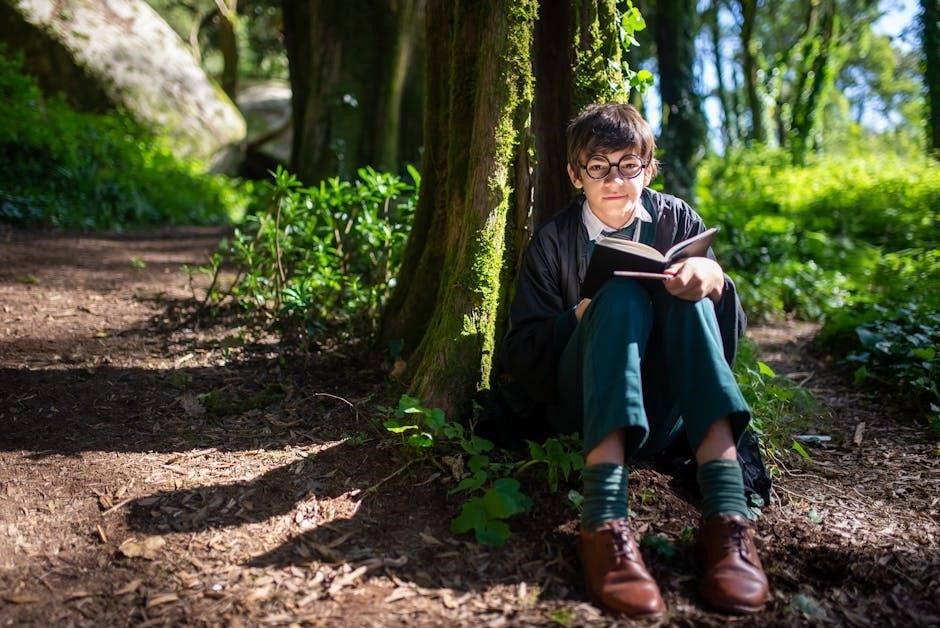Harry Potter and the Philosopher’s Stone‚ written by J.K. Rowling‚ introduces the magical journey of orphan Harry Potter‚ who discovers his wizarding heritage and enrolls in Hogwarts.
Overview of the Book
Harry Potter and the Philosopher’s Stone‚ written by J.K. Rowling‚ is a fantasy novel that follows the journey of an orphan boy‚ Harry Potter‚ who discovers his magical identity. Living with his neglectful relatives‚ the Dursleys‚ Harry learns he is a wizard and begins attending Hogwarts School of Witchcraft and Wizardry. The story explores themes of friendship‚ identity‚ and the battle between good and evil as Harry uncovers the truth about his past and the mysterious Sorcerer’s Stone. This debut novel sets the foundation for the beloved series.
Importance of the First Book in the Series
Harry Potter and the Philosopher’s Stone is crucial as it introduces the magical world‚ key characters‚ and foundational themes of the series. It establishes Harry’s identity and sets the stage for his journey‚ making it essential for understanding the entire narrative. The book’s success laid the groundwork for the series’ global phenomenon‚ captivating readers with its unique storytelling and relatable heroism. Its impact extends beyond literature‚ influencing popular culture and inspiring countless adaptations and fan creations.

Plot Summary
Harry Potter and the Philosopher’s Stone follows Harry’s discovery of his magical heritage‚ his enrollment in Hogwarts‚ and his quest to uncover the truth about the powerful Sorcerer’s Stone.
Harry’s Life with the Dursleys
Harry Potter lives with his cruel relatives‚ the Dursleys‚ in a small cupboard under the stairs. He is mistreated‚ denied birthday celebrations‚ and forced to endure a dreary‚ loveless existence. Harry’s life is marked by neglect and loneliness‚ with his aunt‚ uncle‚ and cousin treating him poorly. This miserable upbringing contrasts sharply with the magical world he is destined to discover‚ as his eleventh birthday approaches‚ bringing with it the revelation of his true identity and the letter that changes everything.
The Discovery of Hogwarts
On his eleventh birthday‚ Harry’s life transforms when Rubeus Hagrid arrives‚ revealing the truth: Harry is a wizard and has been accepted into Hogwarts School of Witchcraft and Wizardry. Hagrid delivers the letter that changes Harry’s life‚ explaining his famous past and his parents’ fate; The discovery of Hogwarts opens a world of magic‚ ending Harry’s miserable life with the Dursleys and beginning his journey to a place where he truly belongs‚ surrounded by wonder and newfound possibilities.
The Journey to Hogwarts and Initial Adventures
Harry boards the Hogwarts Express at Platform 9 ¾‚ beginning his magical journey. He meets Ron Weasley and Hermione Granger‚ forming lifelong friendships. Upon arrival‚ the Sorting Hat places Harry in Gryffindor House. The trio quickly becomes entangled in mysteries‚ including the three-headed dog and a suspicious potions master. Their adventures reveal hidden passages‚ magical objects‚ and the truth about the Sorcerer’s Stone‚ setting the stage for a thrilling year of discovery and danger at Hogwarts.

Major Characters
Harry Potter‚ a young wizard‚ discovers his magical heritage. Hermione Granger‚ intelligent and resourceful‚ becomes his closest friend. Ron Weasley‚ loyal and humorous‚ joins their adventures. The Dursleys‚ Harry’s neglectful relatives‚ oppose his magical journey.
Harry Potter
Harry Potter‚ an orphan living with his neglectful relatives‚ the Dursleys‚ uncovers his true identity as a wizard on his eleventh birthday. He receives a letter from Hogwarts School of Witchcraft and Wizardry‚ revealing his magical heritage. Harry’s journey begins as he leaves his mundane life behind‚ embracing his newfound abilities and facing challenges with courage and loyalty. His story captivates readers‚ highlighting themes of identity and resilience‚ marking the start of an extraordinary adventure.
Hermione Granger
Hermione Granger‚ a brilliant and resourceful witch‚ becomes Harry’s closest friend at Hogwarts. Her sharp intellect‚ quick thinking‚ and dedication to fighting darkness are pivotal in their adventures. Despite initial perceptions of her as know-it-all‚ Hermione’s loyalty and courage earn her respect. Her ability to balance academics with bravery makes her an integral character‚ showcasing the power of knowledge and determination in overcoming challenges.
Ron Weasley
Ron Weasley‚ Harry’s loyal friend‚ comes from a large‚ affectionate wizarding family. His humor and insight often provide comic relief‚ while his bravery shines in tough situations. Despite insecurities and occasional jealousy‚ Ron’s unwavering support for Harry and Hermione underscores his true character. His background offers a glimpse into the wizarding world’s diverse cultures‚ making him a relatable and endearing figure in their collective journey.
The Dursleys
The Dursleys‚ Harry’s cruel and neglectful Muggle relatives‚ represent the ordinary world he must escape. Uncle Vernon‚ Aunt Petunia‚ and cousin Dudley embody selfishness and disdain for anything unusual. Their harsh treatment of Harry highlights his isolation and sets the stage for his magical awakening. Their refusal to acknowledge Harry’s true identity underscores the contrast between the mundane and the magical‚ making their presence a significant element in Harry’s journey toward self-discovery and acceptance of his wizarding heritage.

Themes and Symbolism
Friendship‚ courage‚ and the battle between good and evil are central themes‚ symbolized by Harry’s scar‚ the Sorting Hat‚ and the Philosopher’s Stone.
Friendship and Loyalty
Friendship and loyalty are cornerstone themes in Harry Potter and the Philosopher’s Stone. Harry forms unbreakable bonds with Ron Weasley and Hermione Granger‚ showcasing trust and support. Together‚ they face challenges‚ demonstrating loyalty even in adversity. Their friendship helps Harry navigate the magical world and confront dark forces‚ emphasizing the power of unity and devotion. These relationships serve as a foundation for the series‚ highlighting the importance of standing by one another.
Good vs. Evil
Harry Potter and the Philosopher’s Stone explores the timeless conflict between good and evil. Harry‚ an innocent and brave hero‚ confronts the dark forces embodied by Lord Voldemort‚ who seeks power and domination. The story highlights the struggle between light and darkness‚ with Harry’s inherent goodness and courage pitted against Voldemort’s malevolence. This theme is central to the narrative‚ illustrating the universal battle between morality and immorality‚ and the enduring triumph of good over evil through sacrifice and resilience.
Identity and Belonging
Identity and belonging are central themes in Harry Potter and the Philosopher’s Stone. Harry‚ an orphan living with his neglectful relatives‚ discovers his true identity as a wizard‚ finding solace in Hogwarts. The story explores his journey of self-discovery‚ as he transitions from feeling isolated to forming lasting bonds with Ron and Hermione. The theme of belonging is highlighted through Harry’s acceptance into the wizarding world‚ contrasting with his alienation in the non-magical realm‚ ultimately revealing the power of friendship and acceptance in shaping one’s sense of self.
Writing Style and Structure
J.K. Rowling’s writing style in Harry Potter and the Philosopher’s Stone is descriptive and immersive‚ with a clear structure that builds suspense. The narrative is engaging‚ accessible‚ and well-paced‚ using a third-person limited perspective to focus on Harry’s journey effectively.
Narrative Technique
J.K. Rowling employs a third-person limited narrative in Harry Potter and the Philosopher’s Stone‚ focusing on Harry’s perspective to create intimacy and immediacy. The story seamlessly blends descriptive passages with dialogue‚ making the magical world feel vivid and accessible. Rowling’s use of foreshadowing and suspense keeps readers engaged‚ while her ability to balance action with emotional depth enhances the storytelling. The narrative structure‚ with its clear beginning‚ middle‚ and end‚ effectively builds tension and curiosity‚ drawing readers into Harry’s transformative journey from an ordinary boy to a young wizard.
Language and Tone
J.K. Rowling’s language in Harry Potter and the Philosopher’s Stone is clear and accessible‚ with vivid descriptions that bring the magical world to life. The tone is warm and inviting‚ balancing humor and whimsy with darker themes‚ making it appealing to a wide audience. Rowling’s use of dialogue reflects the characters’ personalities‚ while her narrative voice maintains a sense of wonder and curiosity. The language is simple yet evocative‚ creating an immersive experience that draws readers into Harry’s journey from an ordinary boy to a young wizard.
Publication and Reception
J.K. Rowling’s Harry Potter and the Philosopher’s Stone was first published on June 26‚ 1997‚ by Bloomsbury in London. It became a global bestseller‚ receiving widespread acclaim and launching the successful series.
Initial Publication and Reception
Harry Potter and the Philosopher’s Stone was first published on June 26‚ 1997‚ by Bloomsbury in London. Initially‚ the book received positive reviews and moderate success‚ but its popularity grew rapidly. It won the Nestlé Smarties Book Prize and was named the Children’s Book of the Year by the British Book Awards. The novel’s unique storytelling and relatable characters resonated with readers worldwide‚ setting the stage for the beloved series. Its success marked a turning point in children’s literature;
Translations and Editions
Harry Potter and the Philosopher’s Stone has been translated into over 80 languages‚ including Latin and Ancient Greek. Various editions‚ such as anniversary and illustrated versions‚ have been released. The book’s global reach expanded further with translations‚ making it accessible to diverse audiences. Special editions‚ like the 10th and 15th-anniversary versions‚ feature new covers and introductions‚ enhancing its appeal. This widespread availability has solidified its place as a cultural phenomenon in literature.
Awards and Recognition
Harry Potter and the Philosopher’s Stone received widespread acclaim‚ earning numerous awards. It won the Nestlé Smarties Book Prize‚ the British Book Awards‚ and the Sheffield Children’s Book Award. The novel also topped the New York Times bestseller list and was named one of the best-loved books by BBC’s The Big Read. Its success marked the beginning of a cultural phenomenon‚ solidifying its place in literary history and paving the way for the series’ global recognition and enduring popularity.

Cultural Impact
Harry Potter and the Philosopher’s Stone sparked a global phenomenon‚ inspiring movies‚ merchandise‚ and fan communities. It reshaped young adult literature and influenced education and pop culture worldwide.
Popularity and Fan Base
Harry Potter and the Philosopher’s Stone became a global sensation‚ selling millions of copies worldwide. Its relatable themes and magical world attracted readers of all ages. The book’s success spawned a devoted fan base‚ with enthusiasts creating fan art‚ fan fiction‚ and attending events like Comic-Con. The series has been translated into over 80 languages‚ further expanding its reach. This cultural phenomenon continues to inspire new generations‚ cementing its place as a literary and pop culture icon.
Influence on Literature and Media
Harry Potter and the Philosopher’s Stone revolutionized young adult literature‚ inspiring a wave of fantasy novels. Its impact extended to film‚ with the book-based movie launching a successful franchise. The series influenced media by popularizing the “chosen one” trope and redefining children’s entertainment. It also spurred fan-driven content creation‚ such as fan fiction and art‚ fostering a collaborative cultural landscape. The book’s success reshaped publishing strategies‚ emphasizing the potential of genre fiction and cross-age appeal.

Adaptations
Harry Potter and the Philosopher’s Stone was adapted into a successful film in 2001‚ directed by Chris Columbus. The movie stayed faithful to the book’s narrative‚ capturing its magical essence and launching the beloved franchise. The film’s success paved the way for subsequent adaptations‚ solidifying the story’s global appeal and introducing Harry Potter to a broader audience beyond readers.
Movie Adaptation
The film adaptation of Harry Potter and the Philosopher’s Stone‚ released in 2001‚ was a groundbreaking achievement. Directed by Chris Columbus‚ it brought J.K. Rowling’s magical world to life‚ featuring memorable performances from Daniel Radcliffe‚ Emma Watson‚ and Rupert Grint. The movie remained faithful to the original story‚ capturing the essence of Harry’s journey from an ordinary boy to a wizard. Its success not only set the stage for the rest of the franchise but also became a cultural phenomenon‚ enchanting audiences worldwide with its visual and emotional depth.
Other Media Forms
Beyond the book and film‚ Harry Potter and the Philosopher’s Stone has expanded into various media forms. These include video games‚ allowing fans to explore Hogwarts interactively. Audiobook versions narrated by Stephen Fry and Jim Dale have also been widely popular. Additionally‚ the story has been adapted into a stage play‚ further immersing audiences in Harry’s world. These diverse formats ensure the story’s accessibility and enduring appeal‚ reaching fans across different platforms and generations. The franchise’s multimedia approach has solidified its place in global pop culture.
Controversies and Criticisms
Harry Potter and the Philosopher’s Stone faced criticism for its depiction of magic‚ with some religious groups claiming it promoted witchcraft. Literary critics debated its originality and complexity.
Religious and Cultural Controversies
The Harry Potter series‚ including the first book‚ sparked debates due to its magical themes‚ with some religious groups accusing it of promoting witchcraft and undermining Christian values. Certain critics argued that the portrayal of magic could lead young readers away from religious beliefs. Additionally‚ cultural controversies arose as the series was translated and adapted across different regions‚ sometimes altering names and terms to fit local sensitivities‚ such as the change from “Philosopher’s Stone” to “Sorcerer’s Stone” in the United States.
Literary Criticism
Literary Criticism
Literary critics have praised Harry Potter and the Philosopher’s Stone for its engaging narrative and universal themes. Some scholars highlight its use of mythological motifs and coming-of-age elements. However‚ a few critics argue that the book’s prose is simplistic and lacks depth. Despite this‚ the novel’s ability to connect with readers of all ages has solidified its place in contemporary literature‚ making it a subject of both admiration and analytical discussion among scholars and readers alike.

Legacy and Sequels
Harry Potter and the Philosopher’s Stone’s success spawned six sequels‚ creating a global phenomenon and expanding into movies‚ inspiring millions and shaping modern literature.
Impact on the Series
Harry Potter and the Philosopher’s Stone laid the foundation for the series‚ introducing key characters and themes. Its success ensured the continuation of Harry’s journey‚ captivating readers globally and setting the stage for the epic battle between good and evil. The first book’s charm and originality hooked audiences‚ making it a cornerstone of the franchise’s enduring popularity and cultural significance.
Future Books and Expanded Universe
The success of Harry Potter and the Philosopher’s Stone led to a seven-book series‚ expanding the magical world and deepening its lore. Subsequent books explored darker themes‚ character growth‚ and the escalating battle against Voldemort. The franchise also expanded into movies‚ spin-offs like Fantastic Beasts‚ and companion books‚ creating a vast‚ immersive universe. The first book’s foundation enabled this growth‚ solidifying Harry Potter as a cultural phenomenon and inspiring new generations of fans and storytellers.
